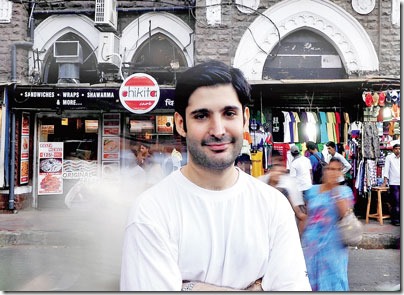Memory isn’t the most reliable repository for facts, of course. Nor is Google. But, when one talks of a South Mumbai snack bar that has a history dating back to the time when Malabar Hill was still a new part of what was then Bombay, memories become most important.
By Dhamini Ratnam | Mumbai Mirror
As is wont with them, many Chikitas emerge. One, a snack bar where students of St Anne’s School, Campion, and Convent of Jesus and Mary would drop in for a quick Mutton pattice during lunch hour. Another, where take-away Frankees would be gobbled down quickly before a movie at Regal cinema, located across the street. “The movie experience would have been incomplete without a Frankee from Chikita,” laughs 28-year-old Walkeshwar resident, Kshama Shroff, who’d drop in at least once a week with her parents during a family outing to Regal. As a doctoral student of microbiology at the Indian Institute of Science, situated in the neighbourhood, Shroff would often visit the café for snacks between classes.
 In more recent times, the name came to be associated with a whiff of scandal – the booths upstairs were given out by the hour to, shall we say, excited customers. But then oldtime residents reason, Colaba has always been a little seedy. In 2007, the familiar yellow board came down and a green one went up instead, as Chikita gave way to Lebanese food joint, Falafel. Then, in November last year, Meherwan Jamshedian, the 31-year-old son of proprietor Farrokh Jamshedian, restarted Chikita (the new avatar is called Chikita Café) without much ado.
In more recent times, the name came to be associated with a whiff of scandal – the booths upstairs were given out by the hour to, shall we say, excited customers. But then oldtime residents reason, Colaba has always been a little seedy. In 2007, the familiar yellow board came down and a green one went up instead, as Chikita gave way to Lebanese food joint, Falafel. Then, in November last year, Meherwan Jamshedian, the 31-year-old son of proprietor Farrokh Jamshedian, restarted Chikita (the new avatar is called Chikita Café) without much ado.
“We’re taking it slow and steady,” says his wife, Delnaz, who works in a chartered accountant’s firm in Fort. She means it. Residents of the area, Cuffe Parade and even Marine Drive, began to see flyers of Chikita Café stuffed between their morning papers at the start of the New Year. But the couple hasn’t invested in any other publicity. Despite that the two say that they’ve managed to draw in a sizeable crowd already.
“We’ve been able to stay afloat because we’re not paying a hefty rent,” says Meherwan, whose father became a partner at Chikita in 1970, a good 20 years after the café was opened by the D’Limas, a Catholic couple. The only overheads, says Meherwan are salaries, equipment (he has installed air conditioners on the mezzanine floor above, and yes, the booths are gone, in case you were wondering) and electricity.
In 2007, Meherwan became the sole selling agent of Falafel, a Lebanese food joint, in Colaba in order to increase sales and attract foreign tourists. “I’ve always liked Lebanese cuisine and thought it would be great to draw in tourists that throng Colaba,” he explains. Soon after, the owners of Falafel – an Israeli couple – sold their company to a Gujarati businessman who forbade the sale of non-vegetarian food. “I’m Parsi,” laughs Meherwan. “I really wanted to introduce meat-based Falafel.”
Is that why the new café has only one vegetarian sandwich in its selection, against a gang of six non-vegetarian ones?
Meherwan smiles sheepishly and says, “We’re introducing more vegetarian food items, in pasta, nachos and kebabs, by April.” To be fair, the Café does have Hummus Pita & Falafel (Rs 130), Paneer shwarma (Rs 110), Caeser salad (Rs 100), Frankee (Rs 70), and Russian salad roll (Rs 70), for the vegetarians as well.
Interestingly, all ‘snacks’ – the Café also serves grilled sandwiches, grilled rolls, French fries, and three desserts – are well-priced. The most expensive item on the menu is the Roast turkey sandwich for Rs 170, made in freshly-baked herb bread. The owners could re-think their policy to heat this well-stuffed sandwich, but it qualifies rather well as a hearty snack. The shwarma isn’t the best around, and the roti tends to turn crisp since it, too is heated. However, most wraps are well-sized pieces within the range of Rs 110 to Rs 145.
The Tres Leches dessert (for Rs 70), a Spanish speciality and Delnaz’s favourite, can satisfy a sweet tooth on a hot day, but we’d like to see more beverages.
“Our USP is our price point. We’ve kept it deliberately low to attract all kinds of visitors, including foreigners who want a yummy but low-cost snack,” Meherwan says about their strategy to beat competition from existing Parsi joints and the 11 new eateries that have opened in the neighbourhood in the last year. According to his father, low price points have always been the café’s USP.
Speaking of those days, 68-year-old Jamshedian says, “We deviated from the typical Parsi-Irani menu, by serving cutlets, Goa sausage rolls and vegetarian club sandwiches. I wanted to cater to the middle class, who wanted good, hygienic food at affordable prices.”
His son, as any true Parsi restaurant heir, is following his pappa’s footsteps.
